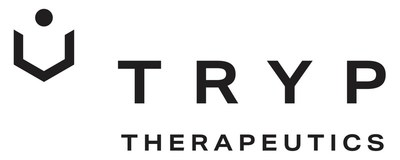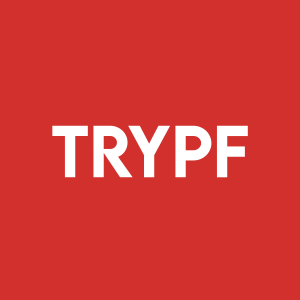Tryp Therapeutics Strengthens IP Portfolio with Provisional Patent Application for Binge Eating Disorder Treatment
Tryp Therapeutics (CSE: TRYP, OTCQB: TRYPF) announced the filing of a provisional patent for psilocybin's use in treating Binge Eating Disorder (BED) as part of its strategy to enhance intellectual property protections. This filing complements the Phase II S.T.O.P. trial with the University of Florida, showing potential benefits for BED patients. The patent aims to protect its drug candidates TRP-8802 and TRP-8803. The Company focuses on unique therapeutic approaches distinct from competitors, striving for breakthroughs in treating neuropsychiatric disorders with psilocybin-based therapies.
- New provisional patent filed for psilocybin treatment of Binge Eating Disorder.
- Phase II trial shows potential benefits for patients with BED.
- Strengthening of intellectual property protections for TRP-8802 and TRP-8803.
- Focus on unique therapeutic approaches sets Tryp apart from industry competitors.
- None.
Biotech Company Strengthens Strategic Intellectual Property Protection of Targeted Indication
SAN DIEGO, June 29, 2022 /PRNewswire/ -- Tryp Therapeutics, Inc. (CSE: TRYP) (OTCQB: TRYPF) ("Tryp" or the "Company"), a clinical-stage biotechnology company focused on developing psilocybin-based compounds for diseases with unmet medical needs, announced today the filing of a new provisional patent for the use of psilocybin for the treatment of patients with Binge Eating disorder (BED).
The new patent application is part of Tryp's corporate strategy to expand the clinical utility of psilocybin-assisted therapy in patients with BED who are awaiting transformative medicines. Tryp's Phase II S.T.O.P. (Study of the Treatment of Overeating utilizing Psilocybin) trial in collaboration with the University of Florida, represents the first use of psilocybin in conjunction with psychotherapy as a therapeutic intervention in patients with BED. The initial data readout for the first patient dosed in the STOP trial showed potential benefit for patients with BED, further supporting the Company's commitment to developing psilocybin based therapies for patients with eating disorders. Once issued, the new patent will provide Tryp with an Intellectual Property Protection for BED utilizing its psilocybin-based candidates TRP-8802 and TRP-8803.
"We have elected to pursue indications that are distinct from other industry players, thereby distinguishing our research and development pipeline among our peers," said Jim Gilligan, Interim CEO and Chief Scientific Officer, Tryp Therapeutics. "TRP-8802, our clinical candidate, has shown promising early data endpoints. The expansion of our patent portfolio enables us to develop a psychedelic treatment in conjunction with psychotherapy for BED patients while also strengthening Tryp's position as an industry leader with an expanding Intellectual Property Estate."
Tryp is utilizing TRP-8802 to evaluate the use of psilocybin-related compounds in certain neuropsychiatric disorders in early-stage trials. In disorders where efficacy is indicated, Tryp's lead drug candidate TRP-8803 which is being developed concurrently, will be studied in subsequent trials. TRP-8803 includes a unique formulation and delivery system and is designed to enhance the positive effects of psilocybin and psilocybin-related compounds, while markedly reducing the limitations of psilocybin dosed through other routes of administration, including oral, nasal and sublingual.
About Binge Eating Disorder (BED)
- BED is characterized by recurring episodes of eating large quantities of food and feeling unable to stop.
- Nearly
30% of people seeking weight loss treatments show signs of BED. - Up to
3.5% of females and2.0% of males will develop BED at some point in their lives - nearly 4 million women and 2 million men in the United States; treatments to date have not been effective.
About Tryp Therapeutics
Tryp Therapeutics is a clinical-stage biotechnology company focused on developing psilocybin-related molecules, including TRP-8803, for the treatment of diseases with unmet medical needs through accelerated regulatory pathways. Tryp's Psilocybin-For-Neuropsychiatric Disorders (PFN™) program is focused on the development of synthetic psilocybin-related molecules as a new class of drug for the treatment of binge eating, chronic pain, and other indications. The Company has begun enrolling patients in its Phase II trial for the treatment of binge eating disorder at the University of Florida and recently announced an upcoming Phase IIa clinical trial with the University of Michigan to evaluate TRP-8802 for fibromyalgia. TRP-8803 is a proprietary psilocybin-based product that uses a novel formulation and route of administration to potentially improve efficacy, safety and the patient experience. For more information, please visit www.tryptherapeutics.com.
Investor Relations:
Jim Gilligan, Interim CEO
Tryp Therapeutics
jgilligan@tryptherapeutics.com
Media Relations:
Francesca DeMauro
KCSA Strategic Communications
TRYP@KCSA.com
Forward-Looking Information
Certain information in this news release constitutes forward-looking information. In some cases, but not necessarily in all cases, forward-looking information can be identified by the use of forward-looking terminology such as "plans," "targets," "expects" or "does not expect," "is expected," "an opportunity exists," "is positioned," "estimates," "intends," "assumes," "anticipates" or "does not anticipate" or "believes," or variations of such words and phrases or state that certain actions, events or results "may," "could," "would," "might," "will" or "will be taken," "occur" or "be achieved." In addition, any statements that refer to expectations, projections or other characterizations of future events or circumstances contain forward-looking information. Statements containing forward-looking information are not historical facts but instead represent management's expectations, estimates and projections regarding future events.
Forward-looking information is necessarily based on a number of opinions, assumptions and estimates that, while considered reasonable by Tryp as of the date of this news release, are subject to known and unknown risks, uncertainties, assumptions and other factors that may cause the actual results, level of activity, performance or achievements to be materially different from those expressed or implied by such forward-looking information, including but not limited to the factors described in greater detail in the "Risk Factors'' section of Tryp's final prospectus available at www.sedar.com. These factors are not intended to represent a complete list of the factors that could affect Tryp; however, these factors should be considered carefully. There can be no assurance that such estimates and assumptions will prove to be correct. The forward-looking statements contained in this news release are made as of the date of this news release, and Tryp expressly disclaims any obligation to update or alter statements containing any forward-looking information, or the factors or assumptions underlying them, whether as a result of new information, future events or otherwise, except as required by law.
NEITHER THE CANADIAN SECURITIES EXCHANGE NOR ITS REGULATION SERVICES PROVIDER HAS REVIEWED OR ACCEPTED RESPONSIBILITY FOR THE ADEQUACY OR ACCURACY OF THIS RELEASE.
![]() View original content to download multimedia:https://www.prnewswire.com/news-releases/tryp-therapeutics-strengthens-ip-portfolio-with-provisional-patent-application-for-binge-eating-disorder-treatment-301577472.html
View original content to download multimedia:https://www.prnewswire.com/news-releases/tryp-therapeutics-strengthens-ip-portfolio-with-provisional-patent-application-for-binge-eating-disorder-treatment-301577472.html
SOURCE Tryp Therapeutics
FAQ
What is Tryp Therapeutics' new patent about?
How does the Phase II S.T.O.P. trial relate to the new patent?
What are TRP-8802 and TRP-8803?
What distinguishes Tryp Therapeutics in the biotech industry?








